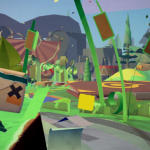When Games Matter is a weekly exploration by Drew Dixon of meaningful moments in games. Operating under the assumption that games do in fact matter, Drew seeks to highlight those moments that have much to say to say about who we are and the world we live in.
I have been writing a lot lately about how games have a unique power to bring people together. I have also been writing about how frustrating they can be and how they are so often bent toward competition. Behind each of these explorations is the question: what is a game? Is it merely a set of rules in which we participate? Must games by their very nature be competitive?
I think there is an element of competition in every game, whether the goal merely be to complete it, every game has a goal and completing that goal requires competition against and opponent or the game itself. There are ways of making such instances less frustrating and more fulfilling though as this has been my experiences playing Pandemic with numerous friends lately.
The best way I can describe Pandemic is that it is the opposite of Risk. In Risk you compete with your friends to conquer the world, in Pandemic, you work with your friends to save it. Each player has a unique role that gives him/her special abilities that aid in curring rapidly growing diseases that are plaguing the world. Each turn the spread of the plague is increased and so the game gets increasingly difficult as you progress. You win together or you die together, no one player wins over and against anyone else.
If you have any hope of winning, you must work together. In my short experience with the game, play becomes so team-based that the effort really ceases to be individual and morphs into a decisively collaborative experience. I will say that in the groups I have played with (admittedly almost entirely new players), I have lost more games than I have won and yet I don’t think I have ever had more fun losing at a board game. When we lose we reflect on what we might have done better and what mistakes perhaps led to our losing and yet even though some of those mistakes can be attributed to an individual, play becomes so shared that everyone seems to take responsibility for everyone else’s mistakes. In fact when I lost recently, it was due to a mistake that I convinced my teammate to make thinking it would help.
When I announced to the group that I had encouraged the mistake that lead to our defeat I was quickly met with numerous comments about things that each of them could have done differently. We all owned this defeat and instead of blaming each other, we commiserated which was much more enjoyable. Perhaps I had this experience simply because of the wonderful people with whom I was playing, but I think game design had something to do with it as well. The idea of such thoroughly collaborative play is now something that I am looking for in more games, because I don’t think a board game has ever felt so shared and meaningful.











